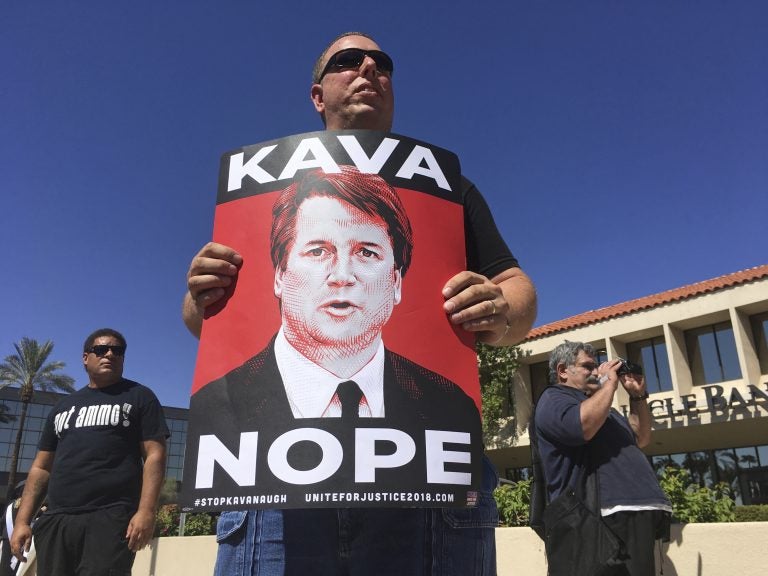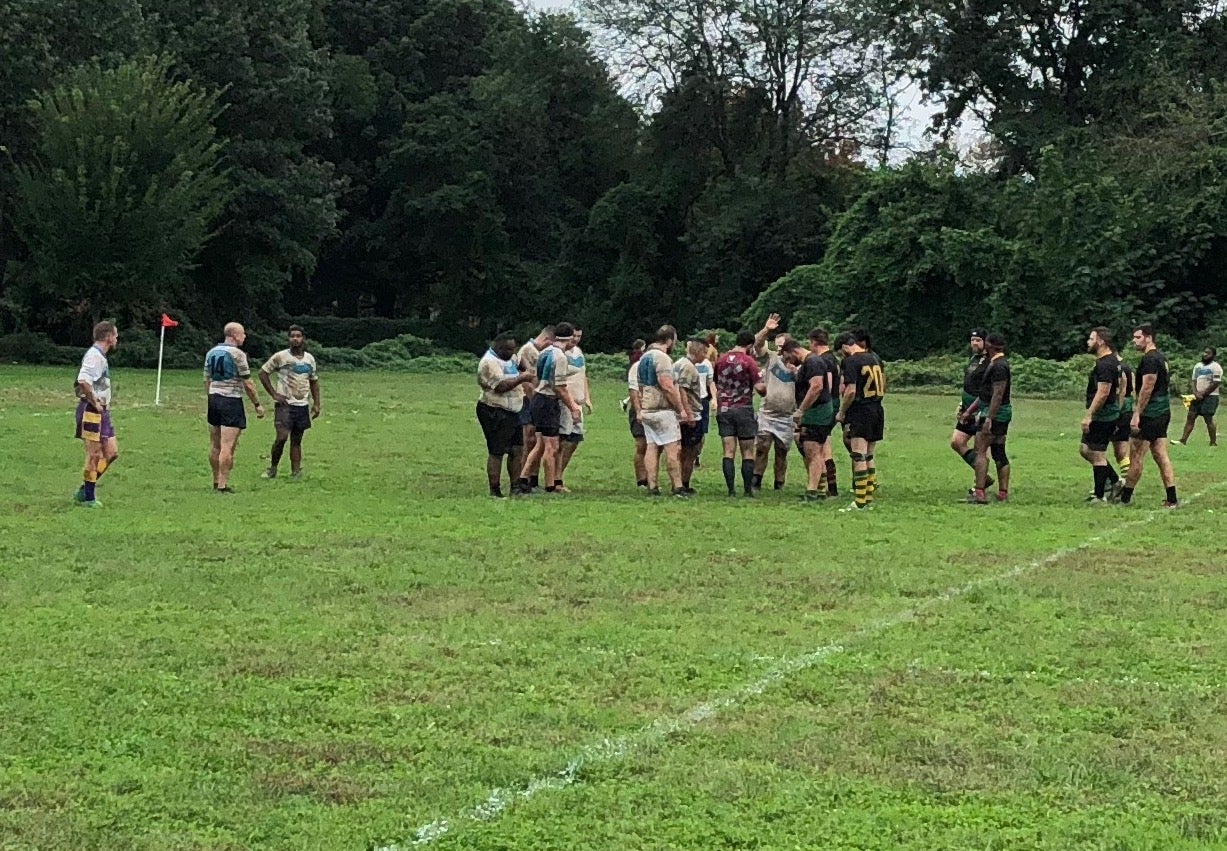Post-Kavanaugh, men reflect on accountability
Some of the men seemed to be struggling with this stuff. They’d say one thing, then contradict themselves a minute later.
Listen 4:10
A man holds up a sign during a protest against Supreme Court nominee Brett Kavanaugh outside the offices of Arizona Sen. Jeff Flake in Phoenix, Friday, Sept. 28, 2018. (AP Photo/Patricio Espinoza)
Brett Kavanaugh’s confirmation to the U.S. Supreme Court — and the hearings leading up to the Senate vote — have triggered a lot of difficult conversations about sexual assault and consent.
Who do we hold accountable, for what and for how long?
I wanted to find out how men were talking about these issues among themselves. Are they looking more critically at incidents in their own past? Are they acting differently now?
To gain some insight, I hung on the sidelines during a recent Eastern Pennsylvania Rugby Union game.
I chose rugby because it’s rough and tumble. The guys come from all over, they’re all ages, and lots of them have been playing together for years. The culture is steeped in tradition — and also in beer. Spectators drink from their lawn chairs, players drink when they’re subbing off — most of the men I spoke with were drinking while we talked.

It seemed like a good place to try to do some eavesdropping. How are men talking to other men about accountability?
I met Jim from Doylestown. He was smoking a cigar as he watched the game — he’s 62 and doesn’t play anymore, just comes to games to support others. He didn’t want us to use his last name.
I asked him if the Kavanaugh hearings made him think about incidents he might have witnessed in a different way.
“Well that’s the reason I’ll never run for politics — cause I wouldn’t be any good, I’ll tell you that,” he said, chuckling.
“Listen, we’re rugby players, we’ve seen a lot of things. Whether we’re proud of or happy about things we did or said — I’m not. I wouldn’t subject myself to that kind of scrutiny.”
Jim seemed ready to accept that personal pasts might make some a bad fit for a high-level position, but not everyone felt that way.
Part of growing up
Tom Colucci thought men deserve a bit of slack — especially for things that happened a long time ago. Colucci, 50, lives in Lewes Delaware, and he refereed the game.
“Some stupid foolish things were probably done by a lot of guys,” he said. “We’re idiots, that’s what we like to say about ourselves. We do stupid things, and we tend to try to grow out of it. That’s what growing up’s about — gotta let people make some mistakes.”
But Philip Shank, a lawyer in Philadelphia, resents the excuse “that boys will be boys.” That mantra was often repeated in the wake of allegations by Christine Blasey Ford that the future justice sexually assaulted her when the two were in high school.
“What boy hasn’t done this in high school?” said a Kavanaugh supporter voter during a CNN interview.
“What high school student hasn’t done this? Well, I haven’t, I know my brothers haven’t,” said Shank, who said his weekends in high school were more likely to have been spent playing Dungeons and Dragons than chasing girls. But, he said, even if he had been partying in high school, he doesn’t think being young and drunk gives men a free pass.
“It is kind of an offensive notion that prior to the age of 18, if you’re a junior or senior in high school or whatever, you’re entitled and allowed to figure out what it’s like to be with someone of the opposite sex — but not in a respectful way,” he said. “So you’re gonna hold me to a lower standard? I don’t think so.”
Some of the men I talked with at the game seemed to be struggling with this stuff. They’d say one thing, then contradict themselves a minute later.
One guy was adamant that it was inappropriate to judge Kavanaugh for what happened in the past — it happened a long time ago, he reasoned, and wouldn’t affect the judge’s ability to do his job. But when considering the prospect of his daughter being assaulted when she went off to college, he said he’d want perpetrators to be held fully accountable — no matter what, no matter when.
Concrete advice amid a world of confusion
That kind of confusion appears to be fairly common.
“Culture is sending mixed messages all over the place,” said Jackson Katz, who frequently writes a about masculinity and teaches boys and men about gender-based harassment.
On the one hand, said Katz, confirming Kavanaugh indicates you can still be a Supreme Court judge even if you have serious allegations of sexual assault against you. In other ways, our society is saying, don’t stand for this.
“The #MeToo movement is galvanizing a new level of consciousness about the pervasiveness and experience of it and the responsibility of men in that regard,” he said. “And that’s not going to stop just because Brett Kavanaugh is now on the Supreme Court.”
Sean, another rugby fan who declined to give his last name, is thinking about his responsibility.
“I feel that by not speaking out more forcefully against stuff that even comes within a country mile of sexual assault or whatever, I feel that I myself might be responsible for this environment in my own way,” he said. “In the past, my response might be to choose not to associate with certain people — but it’s got to be more than that.”
Katz echoed this idea. He encourages bystander intervention in his trainings, and he urges men to speak up when other men say misogynistic or sexist things.
“In this cultural moment, we need more from men than just quietly supporting women,” he said. “The missing piece is not women’s leadership — we’ve had incredible leadership from women. What we really have not seen enough of is explicit and strong men’s leadership.”
WHYY is your source for fact-based, in-depth journalism and information. As a nonprofit organization, we rely on financial support from readers like you. Please give today.




